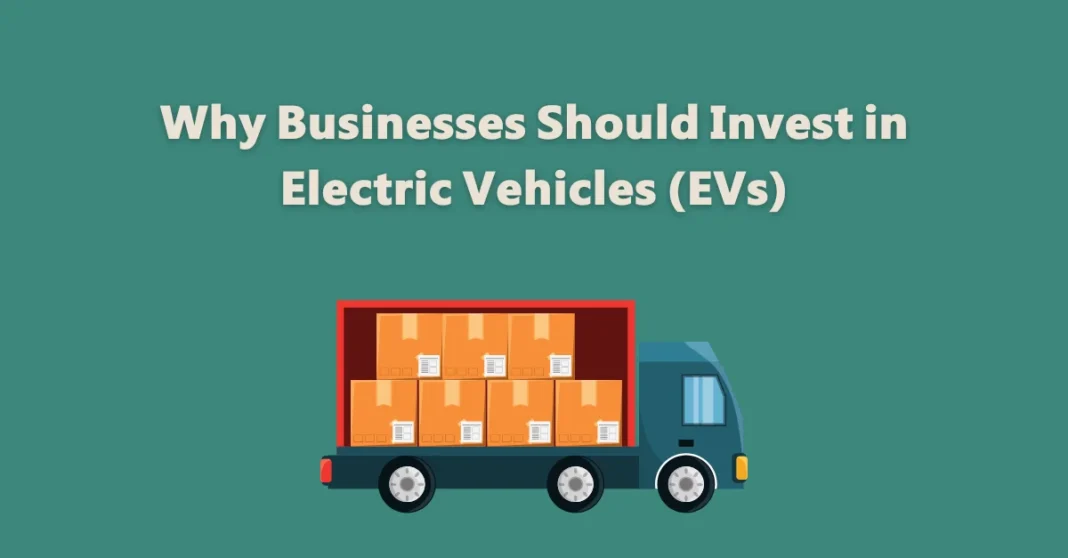As businesses continue to adapt to a rapidly changing landscape, the shift towards sustainable and eco-friendly practices is no longer just a trend, but a necessity. One significant area where businesses can make a meaningful impact is in the adoption of electric vehicles (EVs). As more companies strive to reduce their carbon footprint, improve their corporate social responsibility (CSR) efforts, and cut costs, EVs offer a compelling solution. Here’s why businesses should consider investing in electric vehicles:
1. Cost Savings Over Time
One of the most immediate benefits of transitioning to EVs is long-term cost savings. While the initial purchase price of an electric vehicle can be higher than a conventional internal combustion engine (ICE) vehicle, the cost of ownership over time is significantly lower.
- Lower Operating Costs: EVs are cheaper to maintain, with fewer moving parts compared to traditional cars. There are no oil changes, fewer brake repairs, and the cost of charging is significantly less than fuel for gasoline-powered vehicles.
- Reduced Fuel Costs: Electricity is generally more affordable than gasoline, and with the potential for charging vehicles at home or in the office, businesses can avoid the volatility of gas prices.
2. Environmental Impact and Sustainability
Businesses today are under increasing pressure from both consumers and governments to adopt sustainable practices. By investing in electric vehicles, companies can contribute to the reduction of carbon emissions and play a pivotal role in combating climate change.
- Lower Carbon Footprint: EVs produce zero emissions, making them a cleaner alternative to gasoline and diesel vehicles. By adopting EVs, businesses can drastically reduce their carbon footprint and meet corporate sustainability goals.
- Supporting Green Initiatives: EVs align with environmental goals and can help businesses position themselves as leaders in sustainability. This can be crucial for attracting environmentally-conscious customers and employees.
3. Government Incentives and Subsidies
Many governments around the world are offering incentives to encourage businesses to transition to electric vehicles. These can include tax credits, grants, and rebates, which can significantly reduce the upfront cost of purchasing an EV.
- Tax Benefits: In some regions, businesses can qualify for substantial tax credits or rebates for purchasing electric vehicles, making the transition more financially feasible.
- Exemption from Certain Fees: In some cities, EVs are exempt from congestion charges, parking fees, or tolls, which further reduce the overall cost of ownership.
4. Improved Brand Image and CSR
Companies that prioritize sustainability and environmental responsibility can significantly improve their brand image and gain a competitive edge in the market. Customers, particularly millennials and Gen Z, are increasingly looking to engage with brands that share their values, particularly when it comes to the environment.
- Corporate Social Responsibility (CSR): Adopting EVs shows a commitment to green initiatives and a dedication to reducing the company’s environmental impact, which can help improve stakeholder relationships.
- Consumer Preference: With an increasing focus on environmental consciousness, consumers tend to favor businesses that align with their sustainability goals. Owning and using electric vehicles enhances the company’s reputation and attracts eco-minded customers.
5. Attracting and Retaining Talent
In today’s workforce, employees are looking for employers who are committed to sustainability and social responsibility. By adopting electric vehicles, businesses can attract talent that values these principles.
- Employee Benefits: Offering EVs or providing charging stations at the workplace can enhance the employee experience, as workers become more eco-conscious.
- Talent Retention: Employees, especially those in tech, innovation, and sustainability fields, are more likely to stay with a company that prioritizes green practices.
6. The Competitive Advantage of Going Green
As more businesses adopt eco-friendly practices, companies that are slow to transition may find themselves at a disadvantage. Investing in electric vehicles positions a company as an industry leader in sustainability, which can provide a competitive edge in both marketing and reputation.
- Future-Proofing: As more cities and countries impose stricter emissions regulations, early adoption of EVs allows companies to stay ahead of regulatory changes and avoid penalties.
- Early Adoption Benefits: Early adopters of EVs often gain a first-mover advantage, as they can demonstrate leadership in sustainability and attract eco-conscious customers and partners.
7. Fleet Management and Efficiency
For businesses that rely on fleet vehicles, switching to electric options can offer significant benefits in terms of efficiency and logistics.
- Reduced Downtime: EVs have fewer mechanical parts that can break down, leading to less downtime and more efficient fleet operations.
- Better Tracking and Data: Many EVs come with built-in telematics and real-time data tracking, which can improve fleet management, optimize routes, and enhance overall operational efficiency.
8. Evolving Consumer Preferences
As consumers become more environmentally conscious, there is an increasing demand for brands that align with their values. By adopting electric vehicles, businesses can respond to shifting consumer preferences and expectations.
- Eco-Conscious Consumers: Consumers are increasingly choosing products and services from brands that demonstrate a commitment to sustainability. EV adoption can help businesses meet this demand.
- Long-Term Market Viability: As EV adoption grows globally, businesses that do not make the shift may face challenges in appealing to an environmentally conscious market.
9. Access to Future Mobility Solutions
Investing in electric vehicles can also open doors to emerging mobility solutions, including autonomous electric vehicles, shared electric vehicle fleets, and vehicle-to-grid (V2G) technologies, which allow EVs to return power to the grid.
- Tech Integration: EVs are often integrated with the latest technologies, including AI, predictive analytics, and smart grid systems, making them future-ready for evolving mobility solutions.
- Shared EV Fleets: Businesses can explore opportunities in the sharing economy by offering EV fleets for short-term rentals or ride-sharing, creating new revenue streams.
10. Meeting Environmental Regulations
Governments and international bodies are increasingly setting stricter emissions standards. By investing in EVs, businesses can stay compliant with these regulations and avoid fines or penalties for exceeding emissions limits.
- Sustainability Goals: Many companies are required to meet sustainability targets, whether through internal policies or external regulations. EV adoption directly supports these objectives.
Conclusion: A Smart Investment for the Future
Investing in electric vehicles not only makes sense from a financial perspective but also aligns with modern corporate values of sustainability, innovation, and social responsibility. By transitioning to EVs, businesses can reduce operational costs, enhance their brand image, attract top talent, and future-proof their operations. As the world moves towards a greener future, those who invest in electric vehicles today will be better positioned to succeed tomorrow.
#ElectricVehicles #Sustainability #GreenBusiness #BusinessInnovation #EVAdoption #FutureOfTransportation #CleanEnergy #SmartBusiness

